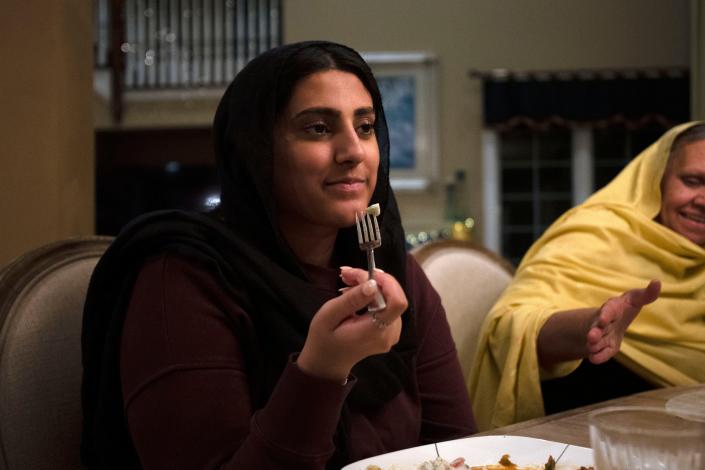While fasting during Ramadan started as a mere tradition their parents would applaud and reward, it is now a deep spiritual practice two local teens believe only God can reward.
Both Maha Malik, of Ivyland, and Sarah Salem, of Lansdale, started fasting for Ramadan around the age of seven with half-day fasts, which is some Muslim parents use to introduce and help their kids get in the habit of abstaining from food and drink for much of the day during for the monthlong holiday.
While half-day fasts for children are more traditional than religious, the teens say it helped them get into the habit of fasting which has become important to them as they have gotten older.
They started fasting in the form it is prescribed in Islam shortly after, in their elementary school years. Now, at 17 and 15, they aspire to embed fasting and other forms of worship into their daily lives, including school and other activities.
Muslim holy month Ramadan started on April 2 this year. Most non-Muslims know Ramadan as the month of fasting from food and drinks — even water — from dawn to sunset. Yet Ramadan involves more than simply avoiding food and drinks.
Ramadan is the ninth month of the Hijri calendar, a 12-month lunar calendar starting from Islamic prophet Mohammed’s hijrah, or journey from Medina escaping persecution in Mecca with his followers.
It is the month when the revelation of the holy book Quran, which happened in phases, was completed in Islamic history. Therefore, it is widely known and practiced as a month of Quran in many Muslim communities.
Muslims make up about 1 percent of the adult population in Pennsylvania, according to Pew Research Center, and less than that in Bucks County. For Sarah and Maha, that doesn’t discourage them from celebrating the holy month.
They say they are incorporating their religious and cultural identities into their everyday lives in a way that doesn’t get in the way of their academics or social life but allows them to celebrate the holy month to its best.

How TikTok inspired a Muslim teen on Ramadan
Last year, Maha Malik, a junior at Council Rock High School South, and her two younger twin sisters were inspired by a Muslim TikTok creator Bisma Parvez and decided to prepare their home for Ramadan. It started a tradition in that carried on to this year.
“Last year we decided that we wanted to decorate our house because it’s our holiday, and we should celebrate it to the best of our capabilities,” Malik said. “(Bisma) has a very nice way of showing her everyday life during Ramadan, and this year we got a lot of our ideas from her.”
They hung fairy lights on their banisters, a “Ramadan Mubarak” banner on their fireplace and a chalkboard wreath that reads a special Ramadan message, and put lanterns on every other step of the staircase in preparation a few days before the holy month.

The celebratory feelings at home isn’t the same outside. Some young Muslims struggle with their identities in the U.S., and about 20 percent of those raised as Muslims do not identify as Muslim in adulthood.
Ramadan can be a challenging time for Bucks County’s Muslim teens, the teens said.
“I do feel apprehensive sharing it sometimes with others … just because some individuals can be very … very hateful. So, it’s hard, as a young person that is growing up in an environment where you’re surrounded by people who aren’t like you. It is very difficult. You’re very scared. Very apprehensive to share what you do,” Malik said.
“It can be hard because you don’t know what people understand. Sometimes they have hidden intentions.”
For teen athletes, fasting on Ramadan poses unique challenges

Sarah Salem is a freshman at North Penn High School, where she runs track and pole vaults. Like Malik, she has been practicing Ramadan since her early childhood.
“My parents introduced it at a very, very young age, and they taught us the importance of it and how it is like ‘We’re not eating so we can be closer to God,’” Salem said. “I just fell in love with it.”
Her Ramadans were special for seeing her Muslim friends at the mosque. She still remembers their countdowns to Iftar, the fast-breaking dinner. They would eat, pray and sometimes even sleep over at the mosque.
“It was honestly just a fun time to connect with all of my Muslim friends again because we all had that one thing in common,” Salem said.

Being an athlete changes her Ramadan game on what she eats before dawn and after sunset which are the only times she gets to eat and drink anything. Therefore, she tries to make most out of it with proteins, veggies, carbs, and most importantly, water.
“(I eat) everything and replenish my water because I did just sweat out everything that I had left in me,” Salem said.
Salem’s coach at North Penn, Brandon Turner, learned about Ramadan from his teammate in college when he ran track at Pittsburgh.
“It was definitely the hardest time of the year for him; it’s hard for everyone,” Turner said. “We’re asking kids to spend a ton of energy out here, and most of that energy comes from food.”

Salem isn’t the only Muslim athlete on her team. There are a few others who practice Ramadan at different levels.
“They do a really good job, I gotta give it to them. It’s not something that I would necessarily see myself being able to do,” Turner said. “(Sarah) is here every day, she makes it through, and we just work with her.”
“We try to make sure that they know, it’s their religious holiday, and it’s not something we want them to not do because of track. Sports are sports. Life is more important.”

This article originally appeared on Bucks County Courier Times: Muslim teens in Bucks, Montco celebrate Ramadan with family and friends
